
Conduct and Discipline in the Mission
With security passes in hand and accompanied by the UNIFIL Gender Officer, the RESDAL team passed through the military checkpoint into the militarized zone in the south of Lebanon on the way to Naqoura – UNIFIL headquarters.
Given the tensions and sensitivities of the area, no access is permitted to foreigners without prior clearance of the Lebanese Armed Forces, while RESDAL is the first organisation from Latin America to be granted authorisation for such a visit to UNIFIL.
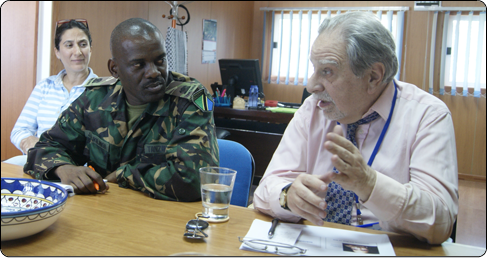
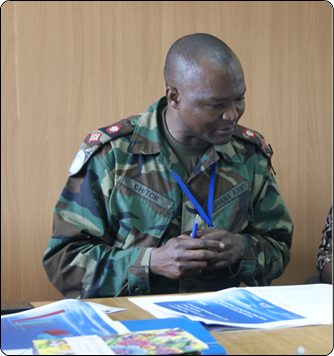
Following a welcome from the Chief of Civil Affairs, Adam Albagir, the team engaged in meetings with the leading officials from the Conduct and Discipline Team (RCDT), which is composed of civilian and military personnel. It’s a well developed office, where their work ranges from the registration of cases to investigations.
Among other issues, points to highlight include the additional complexities of the situation resulting from the surge of Syrian refugees in the country, which add to the existing Palestinian refugee camps. There are now 1,050,000 Syrian refugees registered in Lebanon, but official estimates place the actual figure at 1,500,000. These groups are very vulnerable, and within the predatory economy that has arisen there has been an increasing use of ‘survival sex’ and the practice of marrying-off minors.
A risk-assessment carried out by UNIFIL established an increased concern over the possibility of sexual exploitation and abuse (SEA), with a 3-pronged strategy put in place based around prevention, enforcement, and assistance to victims.
Measures include practices in place for the safeguarding of evidence and preliminary fact-finding enquiries, allowing for a comprehensive report to be passed on to contributing countries should any cases of SEA occur.
Alongside this, UNIFIL is the only mission to have supported the creation of a countrywide SEA prevention network, providing local focal points and direct channels of communication for the local population to communicate any concerns
RESDAL attends celebrations for International Day of United Nations Peacekeepers at UNIFIL HQ
The celebrations were led by the Deputy Force Commander, who honoured those who have fallen while serving the objective of peace in areas distant from their home and thanked troop contributing countries for their “great commitment to United Nations mandates”. He also paid special thanks to the Lebanese Armed Forces for their partnership and cooperation, before thanking peacekeepers – whether civilian or military – for their tireless work.
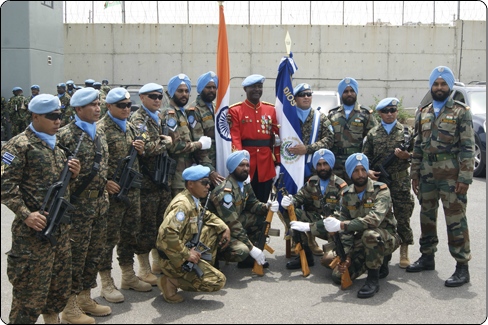
The work of the Division of Political and Civil Affairs – DPCA
UNIFIL is largely a traditional peacekeeping mission rooted in the conflict between two States: Israel and Lebanon.

Within a volatile context defined by major political sensitivities and strong international links, one of the primary functions carried out by the DPCA is the facilitation of greater coordination and channels of communication. Through this it seeks to create conditions conductive to the maintenance of what is a precarious peace.

One of the primary mechanisms for this is the Tripartite Forum. Initially implemented to coordinate the withdrawal of Israeli forces and the simultaneous deployment of the Lebanese Armed Forces, it is the only instance of joint diplomacy between the two countries. It is chaired by the Force Commander, while the Tripartite Secretary is located within the DPCA.
First deployed in 1978 under Security Council Resolutions 425 and 426 - days after the invasion of Lebanon by Israeli forces and with the aim of monitoring their withdrawal- the United Nations Interim Force in Lebanon is one of the longest serving UN peacekeeping missions in place.
Its mandate has evolved notably during its 36 years, with the introduction of UNSCR 1701 in 2006 marking a significant expansion of UNIFIL’s role. Its functions are rooted around 3 principal pillars: (1) controlling the cessation of hostilities; (2) assisting LAF in establishing a zone of exclusion for all armed personnel, goods, and weapons other than those of the Lebanese government and UNIFIL; and (3) assisting the Lebanese government to exercise its authority across the entire Lebanese territory.
It is fundamentally a traditional peacekeeping mission in character, rooted around a large military component of over 10,000 troops that includes the first Maritime Task Force to form part of a UN peacekeeping mission.
UNIFIL is deployed across the south of Lebanon, in an operational zone that stretches from the Litani River to the Blue Line on the southern limits with Israel. This line of withdrawal acts as a de facto division due to the lack of a border between these countries, and its monitoring and verification form the central role of the Mission.
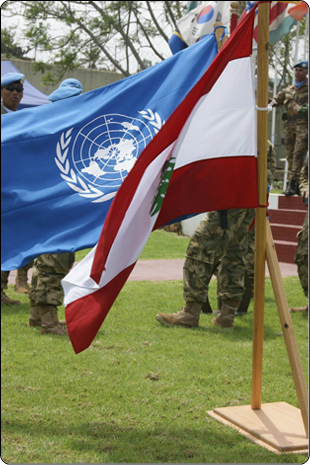
UNIFIL


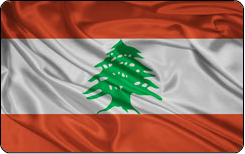
The Lebanon
This land is currently the scene of a sometimes buried and sometimes violent struggle between opposing cultures and interests.
It formed part of the Ottoman Empire and - with its fall resulting from the First World War - of the great scene of a Middle East in which the delineation of borders became a central issue on the agenda. It was part of Greater Syria until 1943, when it became independent from France. An institutional arrangement based on the only official census to be carried out in the country (1932) adjusted the role of the large communities inhabiting the Lebanese territory: the Presidency at the hands of a Maronite Christian, a Sunni Muslim Prime Minister, and a Shia Muslim as President of the Legislative Assembly.
The subsequent history is one of constant conflicts and interventions. Lebanon aligned itself with other Arab countries in the war against Israel in 1948, and was strongly affected by the flow of refugees that arrived from Palestine. In 1958, U.S. military personnel landed in the country to support the then President Chamoun, in the context of internal struggles over whether or not to support the processes of Arab nationalism that were flourishing across the region.
The 70’s were the scene of confrontation between the PLO (Palestinian Liberation Organisation) and Israel. In 1975 sectarian strife broke out in which various groups and militias vied for power, while neighbouring countries intervened either militarily or diplomatically. It was then (1978) that the United Nations Security Council established an interim force to separate the military forces of Israel from its Lebanese opponents and their allies.
A new Israeli invasion occurred in 1982; in alliance with Christian militias the Israeli forces arrived to Beirut, with memorable events including the massacre of Palestinian refugees by a Lebanese militia. In 2006 Israel again invaded the south, which was in the hands of the social-political and militia organisation Hizbollah. This conflict led to the return of UNIFIL.
Given the sensitive nature of demographic issues, and in order to try to maintain stability, political agreements were made that kept the cross-alliances. It is estimated that 60% of the population are Muslim (Shia, Sunni, Alawite), 35% Christian (Maronite, Armenian, Greek Orthodox, etc.), and the remaining 5% Druze or from other minorities.
Financial centre of the Middle East until 1970, now at least 1 in 4 inhabitants were born outside the territory, mainly Palestinians and Syrians. Unconfirmed sources claim that the current refugee population in the territory is nearly equivalent to those that are Lebanese by birth. Lebanese diaspora in the world is also presumably comparable in numbers to half the population living in Lebanon.
UNIFIL, despite its name (Interim Force) is a long-term mission with a unique command structure, as the Head of Mission is also the Commander its the military forces.
A visit to the Strategic Research & Studies Centre of the Lebanese Armed Forces
The RESDAL delegation was received by Brigadier General Khaled Hamade, Director of the Centre, in a visit that began with a meeting in the Director’s office in which which the two organisations exchanged information regarding their respective work and perspectives and held a dialogue regarding south-south cooperation.
The RSSC is the body within the Lebanese Armed Forces that is responsible for conducting studies on issues related to the strategic environment in which the LAF operate. Within this framework, it engages in a multitude of events and conferences in order to promote dialogue and exchange among national and international actors concerning issues such as the situation in the Middle East, the so-called Arab Spring, the Arab-Israeli question, cyber security, natural resources and defence. One of the most relevant events is the Annual Regional Conference, in which representatives from distinct countries across the region participate.
As part of the hospitality received during the visit, the Director then invited the RESDAL delegation to a lunch in the Officer’s Lounge, where the parties were joined by further high-ranking officials from the LAF.
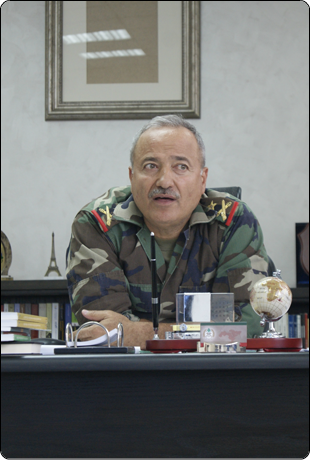
Brigadier General Khaled Hamade, Director of the Strategic Research and Studies Centre.
Hezbollah in the south of Lebanon
UNIFIL’s area of deployment in southern Lebanon, between the Litani River and the so-called "blue line" that approximately marks the boundary with Israel, comprises 108 municipalities of which nearly 90 are mayorships belonging to Hezbollah, elected by the local population.
In the West the name is associated, in journalistic terms, as a "terrorist" group. But the Party of God (official name of the movement), is somewhat more complex. Officially founded in 1985, it is at once a political party (Party of Allah, or Party of God), a paramilitary group (called the Council of Jihad), and a social welfare organisation that provides assistance in education, health and employment. Since 2012 it has been supporting the Syrian government in suppressing the insurgency that has been unleashed across the country.
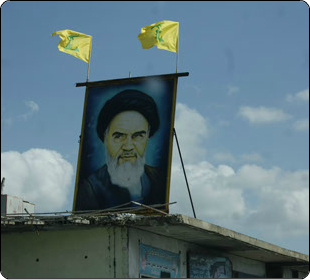
Ayatollah Khomeini on a street billboard.
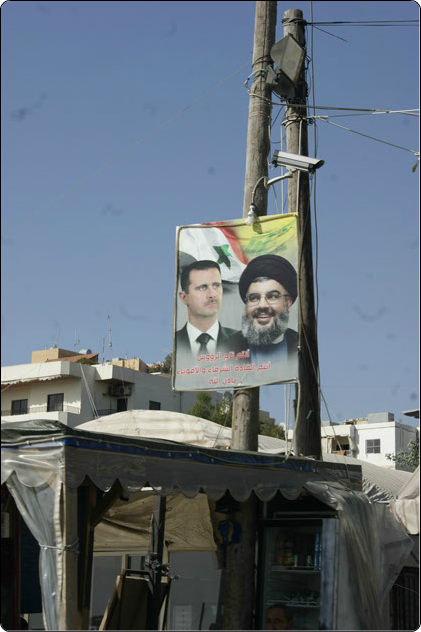
In fact, many refer to Hezbollah as "a state within the state", which in addition to controlling a good part of the municipalities (it also has mayors elected in the Bekaa Valley) has 14 of the 128 representatives in parliament and two seats within the governing cabinet. The movement is anti-Israeli, anti-Western, anti-Wahhabi and follows the Shia belief system. It controls media and is currently part of the "March 8" political bloc.
It was created at the initiative of clerics who recognise the spiritual leadership of the Iranian ayatollahs, and successfully resisted the occupation of the south by Israel, who finally withdrew troops and accepted the presence of UNIFIL as a peacekeeping force. With no disarmament following the Israeli withdrawal, the question of its disarmament is regularly raised by the United Nations Secretary General in reports on the situation in southern Lebanon.
The international community has had to play a balancing act, considering the armed wing as a terrorist grouping while accepting the other actions of the movement as a political party and a social movement that is supported by the majority Shia population. It is assumed that the group, through its paramilitary arm and supported by Iran, was responsible for many attacks, including the AMIA in Buenos Aires in 1994
The Syrian President, Assad, with Nasrallah, leader of Hezbollah
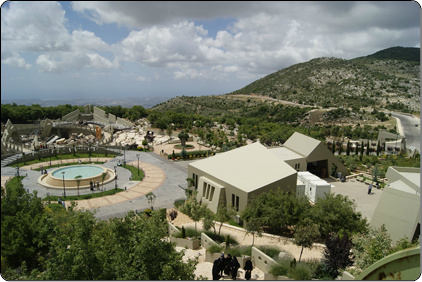
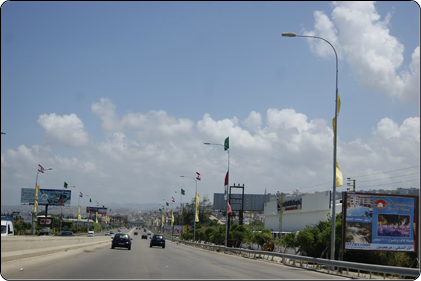
Hezbollah Museum (called the 'Resistance Museum'), close to the locality of Mleeta, in the south.
Throughout the south the yellow flags of Hezbollah alternate with the the Lebanese national flag.
Its exercise of local governments, parliamentary representation, and the fact it has seats in the cabinet means Hezbollah is currently heavily involved in the political game, supporting the Christian General Michel Aoun for the Lebanese presidency while maintaining a "modus vivendi" in order to maintains its militia in autonomous form.
The work of the Gender Unit within UNIFIL
The UNIFIL Gender Unit is the body responsible for mainstreaming a gender perspective into the work of the mission. It is based at the UNIFIL headquarters in Naqoura, and coordinates its work across the Mission, engaging with both civilian and military components at command and tactical levels in the field.
In relation to the military component, the Mission is subject to two directives from the Force Commander (2010 and 2013) that guide the gender perspective in the Mission. According to Mission officials, on the first day of the last Head of Mission’s mandate an announcement appeared on the computer screen of all personnel stating the relevance of gender training and the decision to make the course obligatory.
For this reason, gender training is obligatory for all military personnel. While not all military contingents would have received gender training prior to deployment, at least 2 gender focal points will be present in each battalion or company – with more in larger ones - and they generally begin this on-mission training with the gender unit within around two weeks of arriving at the Mission.
They receive a 3-day gender-training course at the sector command level – where all battalions/offices are represented in Military Gender Task Forces whose role it is to ensure UNIFIL’s military operations are gender sensitive. One of the roles of the gender focal points is to assure that all gender training is available in the national languages of all troop contributors in an effort to overcome the language barrier and increase the level of interest and engagement. It is also the battalion commanders themselves that sign training certificates with their gender focal point as a form of generating ownership of gender issues at the battalion levels.
Civilian personnel are also subject to a directive – issued by Mission Support (head of training and personnel) - making prior completion of the gender mainstreaming course a prerequisite for engaging in any external travel.
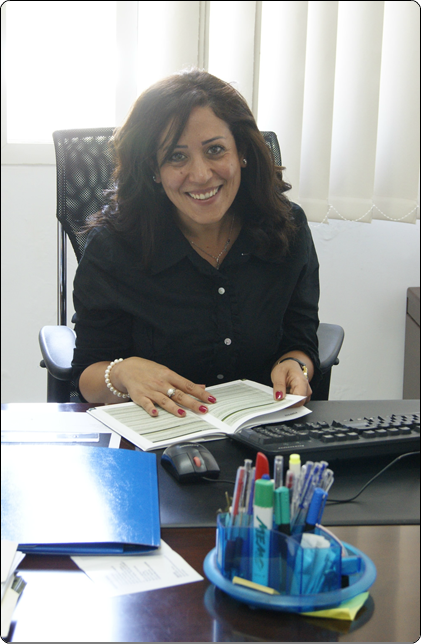
Rana Rahal of the UNIFIL Gender Unit.

![[HOME]](images/blank.gif)







